
Nell Haynes is a faculty member in the Department of Global Studies and coordinator of the Anthropology and Intercultural Studies programs at Saint Mary's College. Her research addresses themes of gender & indigeneity in Latin America. Specifically she is interested in the ways that notions of who counts as "authentically indigenous" become expressed through and troubled by popular culture and media. Nell earned her Ph.D. in Anthropology at American University in 2013 with a concentration in Race, Gender, and Social Justice, and holds a Bachelor of Science Degree from Northwestern University in Anthropology and Theater. Nell has previously worked at Georgetown University, Northwestern University, Pontificia Universidad Católica de Chile, and University College London. Nell is author of Social Media in Northern Chile (2016), co-author of How the World Changed Social Media (2016), and co-editor of The Routledge Companion to Media Anthropology. Nell is currently working on her second book, which explores how the pop culture spectacle of lucha libre, featuring women as chola characters, reflects and contributes to current debates over the nature of indigeneity in Bolivia. Nell also currently serves as the book review editor of Journal of Latin American and Caribbean Anthropology.
latest publications
Polleras, Protest, and Piledrivers: Staging Spectacular Violence in Bolivia
in Bodies on the Front Lines: Performance, Gender, and Sexuality in Latin America and the Caribbean
in Bodies on the Front Lines: Performance, Gender, and Sexuality in Latin America and the Caribbean
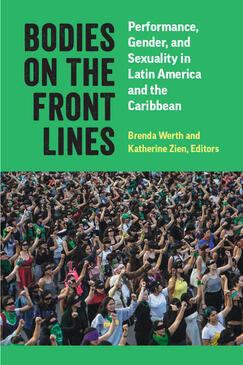
In Bolivia, Indigenous peoples are known for their tradition of rebellion, which began with insurrections against Spanish colonial government in the 1500s. Current protests invoke this history, resulting in dual discourses—that of Indigenous and working-class Bolivians who recall this history with pride and continue to assert their rights within street demonstrations; and another, firmly entrenched with elite Bolivians who decry these protests as violent, uncivilized, and evidence of Indigenous peoples’ inherent inferiority. Within this larger context of discursive links between violence and indigeneity, in the early 2000s women began wrestling in exhibition lucha libre events while wearing the pollera, a skirt associated with the chola indigenous women, and more particularly, with their involvement in protest. Using performance studies, theories on violence and society, and ethnography, this chapter explores the ways that staging violence in spectacular form simultaneously recalls the social hierarchies, state violence, and exclusions that are part of the consequences of colonization in the Americas, as well as presents an opportunity for imagining different futures for Indigenous women.
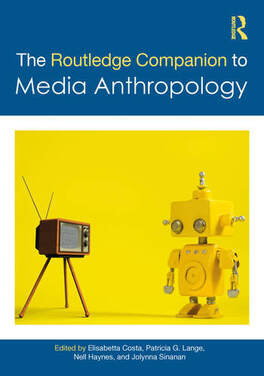
The Routledge Companion to Media Anthropology provides a broad overview of the widening and flourishing area of media anthropology, and outlines key themes, debates, and emerging directions.
The book draws together the work of scholars from across the globe, with rich ethnographic studies that address a wide range of media practices and forms. The chapters offer wide-ranging explorations of how forms of mediation influence communication, social relationships, cultural practices, participation, and social change, as well as production and access to information and knowledge. This volume considers new developments, and highlights the ways in which anthropology can contribute to the study of the human condition and the social processes in which media are entangled.
This is an indispensable teaching resource for advanced undergraduate and postgraduate students and an essential text for scholars working across the areas that media anthropology engages with, including anthropology, sociology, media and cultural studies, internet and communication studies, and science and technology studies.
The book draws together the work of scholars from across the globe, with rich ethnographic studies that address a wide range of media practices and forms. The chapters offer wide-ranging explorations of how forms of mediation influence communication, social relationships, cultural practices, participation, and social change, as well as production and access to information and knowledge. This volume considers new developments, and highlights the ways in which anthropology can contribute to the study of the human condition and the social processes in which media are entangled.
This is an indispensable teaching resource for advanced undergraduate and postgraduate students and an essential text for scholars working across the areas that media anthropology engages with, including anthropology, sociology, media and cultural studies, internet and communication studies, and science and technology studies.
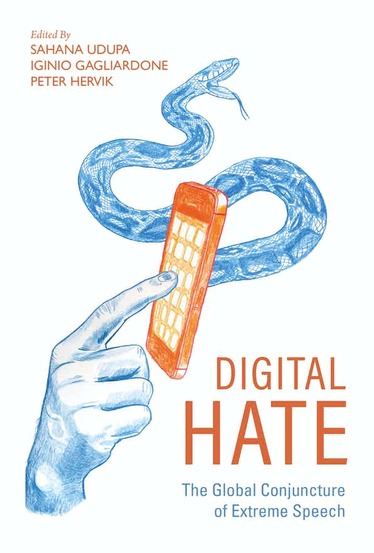
Digital Hate: The Global Conjuncture of Extreme Speech
My previously printed article, Writing on the Walls: Discourses on Bolivian Immigrants in Chilean Meme Humor, which explores the ways Chileans' humorous memes expressing xenophobia against Bolivian migrants naturalizes other forms of violence against them, is now reprinted. The volume has been called "The first distinctly global and interdisciplinary perspective on hateful language online." It's now available here from Indiana University Press.
Moving beyond Euro-American allegations of "fake news," contributors draw attention to local idioms and practices and explore the profound implications for how community is imagined, enacted, and brutally enforced around the world. With a cross-cultural framework nuanced by ethnography and field-based research, the volume investigates a wide range of cases—from anti-immigrant memes targeted at Bolivians in Chile to trolls serving the ruling AK Party in Turkey—to ask how the potential of extreme speech to talk back to authorities has come under attack by diverse forms of digital hate cultures. Offering a much-needed global perspective on the "dark side" of the internet, Digital Hate is a timely and critical look at the raging debates around online media's failed promises.
See the full text here
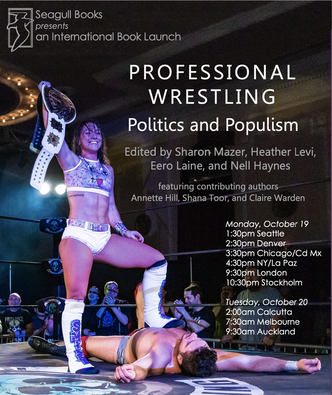
A wildly popular form of mass media and live entertainment, professional wrestling makes a spectacle of violent acts. With its long history of working contemporary events into storylines and commenting upon cultural and military conflicts, professional wrestling is also intrinsically political. This volume asks how professional wrestling is implicated in the current resurgence of populist politics, whether right-wing, or leftist and socialist. How might it do more than reflect and reaffirm the status quo? While provoked by the disruptive performances of Trump as candidate and president, and mindful of his longstanding ties to the WWE, this timely volume looks more broadly and internationally at the infusion of professional wrestling’s worldview into the twinned discourses of politics and populism.
See full description, table of contents, and order the book here
See full description, table of contents, and order the book here
Ethnographic exposure and embodied solidarity: getting into the ring with the Cholitas Luchadoras
For ten months in 2012, as part of ethnographic research, I wrestled in lucha libre events alongside Bolivian women known as the Cholitas Luchadoras. These wrestlers are costumed as ‘cholas,’ wearing pollera skirts closely associated with market vendors and indigenous women . Audience members debate whether they are authentic representations of indigenous women or essentialized racial characterizations. Regardless, the luchadoras have become popular locally and garnered international media attention. While my subjectivity is quite different from theirs,I argue that the exposure and risks of wrestling contributed to a form of ‘embodied solidarity’ among us. We both engaged in essentialization of our wrestling characters along gendered and racial lines, to attract audiences and advance our own aims. In doing so, both the luchadoras and I risked reinforcing some stereotypes and inequalities in order to challenge assumptions – transforming expectations for indigenous women and bringing performance and embodied knowledge more centrally into anthropological discussion. We both used essentialized performances in (hopeful) service of transformative politics. In centering attention on the body, I argue that solidarity in risk and exposure may at times outweigh global inequalities, momentarily reverse or equalize power dynamics, and provide a space in which ethnographic understanding may subvert imperialist histories.
The Chilean Estallido, Plebiscite 2020, and Legacies of Truth-Telling (with Baird Campbell)
A short piece discussing the legacy of the Pinochet-era constitution in present-day Chile, and possibilities for reform in the estallido and Plebiscite 2020.
Journal of Language and Sexuality Special Section:
Sexuality and the discursive construction of the digital self in the Global South (with Baird Campbell)
Constructing the Digital Self in the Global South (Campbell and Haynes)
Authors in this issue think critically about practices of self-formation and the performance of gender and sexuality through media that differ from those that have normalized in the Global North, considering both revolutionary possibility, and re-entrenchment of constraint.
'Overloaded like a Bolivian Truck': Discursive Constructions of Gender, Race, and Nationalism in Northern Chilean Memes
This article concentrates on copper miners in northern Chile and the ways they use memes to make claims related to heterosexuality, modernity associated with resource extraction, and racial mestizaje linked to nationalism.
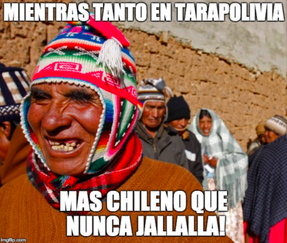
Making Migrant Identities on Social Media: A Tale of Two Neoliberal Cities on the Pacific Rim (with XinYuan Wang)
This article compares social media use in Alto Hospicio, Chile and GoodPath town, China. Both cities have large migrant populations who use social media with stark contrasts in the the identities they form around these migrations. This comparative essay reveals how processes associated with neoliberal capitalism are preconditioned by local contexts, demonstrating that even as media connect people more closely, the effect is anything but homogenizing.
Writing on the Walls: Discourses on Bolivian Immigrants in Chilean Meme Humor
This special issue asks: Why is there so much hate on social media? How dangerous is online vitriol for politics and society? Can there be a universal definition of hate speech?
My contribution explores the ways Chileans' humorous memes expressing xenophobia against Bolivian migrants naturalizes other forms of violence against them.
Read the full journal issue here.
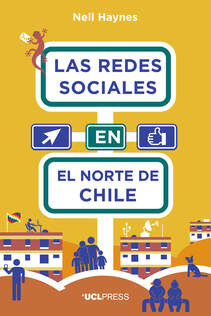
Las Redes Sociales en el Norte de Chile
Social Media in Northern Chile now available in Spanish!
Este libro, que está basado en 15 meses de investigación etnográfica en la ciudad de Alto Hospicio en el norte de Chile, describe cómo sus habitantes usan las redes sociales y los efectos en sus vidas diarias. Nell Haynes sostiene que las redes sociales son un lugar donde los residentes de Alto Hospicio, u hospiceños, expresan sus sentimientos de marginación como resultado de vivir en una ciudad lejos de la capital nacional y con una calidad de vida notoriamente baja en comparación con otras áreas urbanas en Chile.
Al alejarse de manera activa de los habitantes de ciudades como Santiago, los hospiceños se identifican como ciudadanos marginados y expresan un nuevo tipo de norma social. Sin embargo, Haynes descubre que al contrastar sus propias experiencias vividas con las de las personas en áreas metropolitanas, los Hospiceños están fortaleciendo su propio sentido de comunidad y el sentimiento de normatividad que
da forma a su cotidianidad. Esta emocionante conclusión se basa en la variedad de publicaciones en las redes sociales, particularmente Facebook, sobre relaciones personales, política y ciudadanía nacional.
Social Media in Northern Chile now available in Spanish!
Este libro, que está basado en 15 meses de investigación etnográfica en la ciudad de Alto Hospicio en el norte de Chile, describe cómo sus habitantes usan las redes sociales y los efectos en sus vidas diarias. Nell Haynes sostiene que las redes sociales son un lugar donde los residentes de Alto Hospicio, u hospiceños, expresan sus sentimientos de marginación como resultado de vivir en una ciudad lejos de la capital nacional y con una calidad de vida notoriamente baja en comparación con otras áreas urbanas en Chile.
Al alejarse de manera activa de los habitantes de ciudades como Santiago, los hospiceños se identifican como ciudadanos marginados y expresan un nuevo tipo de norma social. Sin embargo, Haynes descubre que al contrastar sus propias experiencias vividas con las de las personas en áreas metropolitanas, los Hospiceños están fortaleciendo su propio sentido de comunidad y el sentimiento de normatividad que
da forma a su cotidianidad. Esta emocionante conclusión se basa en la variedad de publicaciones en las redes sociales, particularmente Facebook, sobre relaciones personales, política y ciudadanía nacional.
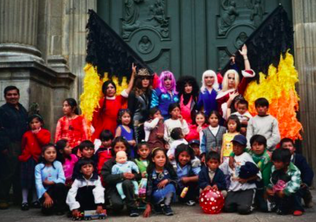
Making Histories of Bolivian Sexual and Diversity Legible in the Twenty-First Century in NOTCHES: Remarks on the History of Sexuality
My blog, written with Bolivian activist and scholar David Aruquipa Pérez, examines how political allegiances and competing priorities have shaped equality movements for LGBTI Bolivians, and thus, their histories.
My blog, written with Bolivian activist and scholar David Aruquipa Pérez, examines how political allegiances and competing priorities have shaped equality movements for LGBTI Bolivians, and thus, their histories.
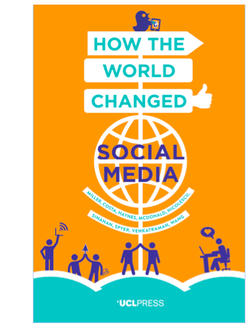
How the World Changed Social Media is the MOST READ OPEN ACCESS E-BOOK ON JSTOR!!!
This book offers a comparative analysis summarising the results of the ethnographic research exploring the impact of social media on politics and gender, education and commerce. What is the result of the increased emphasis on visual communicatin? Are we becoming mroe individual or more social? Why is public social media so conservative? Why does equality online fail to shift inequality offline? How did memes become the moral police of the internet?
How the World Changed Social Media argues that the only way to appreciate and understanding something as intimate and ubiquitous as social media is to be immersed in the lives of the people who post. Only then can we discover how peole all around the world have already transformed social media in such unexpected ways and assess the consequences.
Go to the UCL Press website to order your copy or download free PDFs.
This book offers a comparative analysis summarising the results of the ethnographic research exploring the impact of social media on politics and gender, education and commerce. What is the result of the increased emphasis on visual communicatin? Are we becoming mroe individual or more social? Why is public social media so conservative? Why does equality online fail to shift inequality offline? How did memes become the moral police of the internet?
How the World Changed Social Media argues that the only way to appreciate and understanding something as intimate and ubiquitous as social media is to be immersed in the lives of the people who post. Only then can we discover how peole all around the world have already transformed social media in such unexpected ways and assess the consequences.
Go to the UCL Press website to order your copy or download free PDFs.
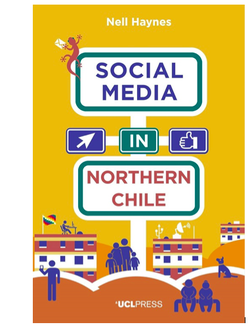
Social Media in Northern Chile: Posting the Extraordinarily Ordinary is now available from UCL Press
Based on 15 months of ethnographic research in the city of Alto Hospicio in northern Chile, this book describes how the residents use social media, and the consequences of this use in their daily lives. Nell Haynes argues that social media is a place where Alto Hospicio’s residents – or Hospiceños – express their feelings of marginalisation that result from living in city far from the national capital, and with a notoriously low quality of life compared to other urban areas in Chile.
In actively distancing themselves from residents in cities such as Santiago, Hospiceños identify as marginalised citizens, and express a new kind of social norm. Yet Haynes finds that by contrasting their own lived experiences with those of people in metropolitan areas, Hospiceños are strengthening their own sense of community and the sense of normativity that shapes their daily lives. This exciting conclusion is illustrated by the range of social media posts about personal relationships, politics and national citizenship, particularly on Facebook.
Go to the UCL Press website to order your copy or download free PDFs.
